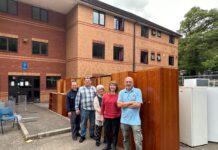
Academics from Swansea University have received £100,000 in funding to help boost essential evidence and understanding around the importance of creating appropriate, social, sustainable, and resilient neighbourhoods, places, and environments for older adults with hearing loss.
The study, led by Dr Emma Richards and Professor Andrea Tales from the University’s Centre for Ageing and Dementia Research (CADR), is being supported through the UK Research and Innovation (UKRI) Healthy Ageing Challenge, which aims to help people remain active, productive, independent, and socially connected across generations for as long as possible.
Over five years, the challenge will invest up to £98 million in healthy ageing, enabling businesses, including social enterprises, to develop and deliver beneficial products, services, and business models.
As part of this, the team at Swansea will increase understanding of the difficulties people with hearing loss experience, such as hearing conversations in a variety of noisy and distracting places, such as shops, cafes, and public transport.
They will also look at how this noise affects not only hearing, but how it impacts attention, cognition, wellbeing, and social interaction.
This evidence will form the basis of addressing the problem, raising awareness of the issue amongst the public, retail and travel sectors, and the need to make hearing loss-related changes to environments.
Dr Emma Richards, Senior Research Officer at CADR, said: “Hearing loss is now recognised as the largest modifiable risk factor in the development of dementia, with a reported 8% of all dementia is caused by hearing loss.
“Hearing loss in older adulthood can lead to isolation and loneliness, and it can be especially difficult hearing conversations in noisy environments, leading to reluctance to go to such places and spaces.
“Arguably, hearing loss can be countered by hearing aids, with evidence indicating they can also reduce dementia risk, but, in reality, this often fails because they remain ineffective in many noisy environments.
“This reduces the ability of older adults with hearing loss to remain active, productive, independent, and socially connected, and this, together with hearing loss per se, represents a risk factor for the development of cognitive impairment and dementia.”
Professor Andrea Tales, Co-Director of CADR, added: “Discussions with audiologists and people attending their clinics reveal that noisy environments are problematic for people with hearing loss, even when a hearing aid is used.
“There is a lack of the research-based evidence specifically required to guide the changes needed for older adults with hearing loss, which this study, thanks to funding from UKRI, we hope will have a positive impact on.”
The team are currently looking for study participants, including:
- Individuals aged over 50 with hearing loss (communication partners are also welcome to attend).
- People who work in the retail, hospitality and transport sectors, with the ability to influence their work environment.
To find out more, please email Dr Emma Richards at E.V.Richards@swansea.ac.uk
Help keep news FREE for our readers
Supporting your local community newspaper/online news outlet is crucial now more than ever. If you believe in independent journalism, then consider making a valuable contribution by making a one-time or monthly donation. We operate in rural areas where providing unbiased news can be challenging. Read More About Supporting The West Wales Chronicle
























